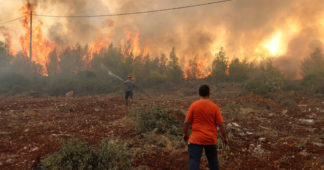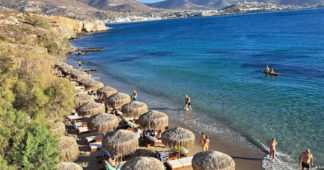In a recent report, it has been revealed that Greece could suffer economic collapse in the next 10 years and with it the collapse of its tourism sector
Cyann Fielding
9 Jul 2024
Tourism in Greece could collapse in 10 years unless major changes are made to the industry, experts have warned.
The holiday hotspot is suffering from ‘over-tourism’ and is not far from suffering a major industry collapse, a study from the European Parliament revealed. The current tourism model is not sustainable and could lead to the tourism sector and a major part of the Greek economy to fall apart within the next 10 years, the report warns.
How water and energy is managed, cultural and historical sites looked after, and coastal zone kept in good shape are all areas of concern raised in the report.
The committee has called for the development of a sustainable model for the tourism sector in Greece, arguing there is currently there a “lack of vision and strategy”.
The numbers of tourists rose dramatically in Greece between 2022 and 2023, with 33 million people visiting the country last year. Santorini, for example, has 15,550 permanent residents and generates around €1 billion annually. Last year, the island welcomed two million tourists.
The growing number of visitors has placed serious strain on cultural, historical and archaeological sites in the country. The Acropolis — one of the most visited monuments worldwide — recently introduced timed entry slots in bid to tackle to overwhelming number of visitors each day.
Other new restrictions have been implemented including a limit on the number of cruise ship passengers visiting Santorini and the creation of traffic zones on the Acropolis. All archaeological sites will see similar measures from April 2024.
The report also warns that the influx of tourists have also caused water issues, with the availability of drinking water a serious issue in many places. Energy consumption by the tourism industry is also noted as an issue, especially within hotel units.
Greek coasts have also suffered, specifically because unrestrained exploration has led to environmental damage.
“The generalised feeling of citizens [is] that the coastal zone and its sharing, are increasingly threatened by the reckless, and sometimes arbitrary, tourist development,” the report adds. Since protests in 2023, the state has passed a new law regulating the development of the coastal zone.
Due to the rising numbers of visitors, many different Greek locations are experiencing increased demand for accommodation. This is despite the fact that in some places, such as Athens, overnight stays in Airbnb-type accommodation now account for more than 40% of the available beds.
“Our country depends to a large extent its economy on tourism, which makes even more imposing the need to manage it in a sustainable way, in order to make it a source of wealth with long-term return and not to exhaust its potential, wasting it and making our tourist destinations unattractive in the long run,” the report reads.
In Greece, tourism represents 25% of GDP and throughout the report their is a emphasis on developing a sustainable tourism model for the future, as the needs of “civil society” must be balanced against “the real economic benefit” of tourism.
We remind our readers that publication of articles on our site does not mean that we agree with what is written. Our policy is to publish anything which we consider of interest, so as to assist our readers in forming their opinions. Sometimes we even publish articles with which we totally disagree, since we believe it is important for our readers to be informed on as wide a spectrum of views as possible.











